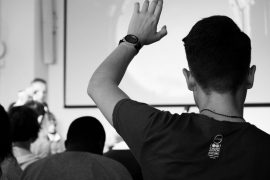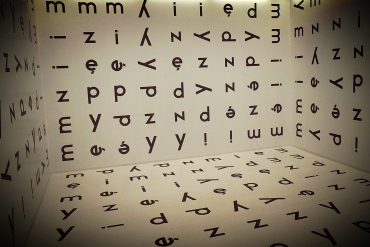Led by Associate Professor Fiona Martin, the Faculty of Arts and Social Sciences subcommittee for Work Integrated Learning have been tasked with investigating the available Work Integrated Learning activities in the faculty, the challenges to offering these opportunities more systematically, and support for colleagues to innovate in their teaching to ‘reach as many students as possible’.
Keen to develop collaborative ongoing relationships with external partners, Fiona is also adamant that for the Arts and Social Sciences, Work Integrated Learning needs to move beyond employability to comprehensively map out how students ‘develop relevant competencies, disciplinary expertise, and career planning alongside an integrated conception of the professional and personal development, in line with the graduate qualities’.
Adopting the taxonomy of WIL evaluation developed by Associate Professor Rachael Hains-Wesson from the Business School’s Work Integrated Learning Hub (‘proximity to the workplace and authenticity of assessment’), Fiona and her team are in the gathering phase of approaching schools and disciplines to find out what kinds of activities are already taking place and how WIL is being scaffolded into assessment design, as well as mapping out how these aspects of curriculum could have more fidelity to the realism, context and problems (Villarroel et al, 2018) students will likely encounter in the workplace. I spoke to Fiona to find out more about Work Integrated Learning and what it means in FASS.
Leanne Stevenson: Fiona, what is Work Integrated Learning?
Fiona Martin: We started with developing a definition because a lot of our colleagues are doing these activities but don’t understand them as Work Integrated Learning. Our definition is: Working Integrated Learning is theoretically informed practical learning experiences that provide students with work-related skills and knowledge and exposure to professional environments in collaboration with sector and community partners.
Leanne: Work Integrated Learning seems obvious in some disciplines like MECO (Media and Communications) and less so in others. What could Work Integrated Learning look like in a Philosophy major?
Fiona: Philosophy is a great example. The core disciplinary expertise of philosophy is used across the board in business. Let’s take AI (Artificial Intelligence) development. At the moment there’s a lot of debate about how any automated systems can be made ethical to prevent data injustice, ensure the individual’s rights to the use of their data, and make sure that it’s not discriminatory. Having a philosopher on your team would be excellent, and we need to create opportunities for philosophy students to be brought into contact with AI developers.

We need to think creatively because all our students are going to end up working somewhere, the question is, can they identify the disciplinary expertise that they have and how it is valuable in these professional contexts?
Leanne: Assessment in a Work Integrated Learning framework makes learning about learning explicit, what they call metacognition in the literature. If students aren’t given the opportunity to realise how they’ve learned something, to do that higher-level learning, then they can’t talk about what they did or how they came to know.
Fiona: Precisely. They struggle to articulate what they’ve got out of a learning experience. When we started FASS4903 (ABC Innovation Research Project Unit) we saw it as a problem-solving unit. Surveying the students at the end, it was clear they could have elaborated much more on their experience if they had been given the language. Once we started to see the unit as a form of consultancy and make it a more authentic experience by incorporating their ideas in the next iteration, we saw more sophisticated reflections from students come back to us.
Leanne: Is there a place for the traditional academic essay in WIL?
Fiona: Yes! The question is how you innovate around the idea of an essay; for example, I set an essay students have to complete online. It is hypertextual writing, they must include links, insert images, correctly insert captions, and copyright details with those images, use data visualisations, tag the material, and it is done in a blog format. It’s an essay but it requires all these other very practical skills that develop their understanding of concepts like hypertextuality, and searchability. We just need to innovate around the practices that we’ve got. This project is not about imposing a single way of doing Work Integrated Learning or indeed saying everything we do must conform to this particular approach. It’s saying, ‘here is best practice, here are our aims, now how can we progress those’.
Leanne: ‘Job-ready’ is the mantra of the Australian welfare state. Work Integrated Learning can certainly be interpreted as having a neoliberal agenda to foster the entrepreneurial self in students – what do you think about these critiques?

Fiona: Sure, there is a sense in which we are all being nudged that way, simply by the types of government and societies that have been developed over the last 40 years. But we recently met with the FASS (Faculty of Arts and Social Sciences) Industry Advisory Board, and our partners identified only 4 skills they look for in graduates and are much more interested in qualities such as empathy, curiosity, autonomy, cultural competence, and critical thinking. In FASS, we really want our students to be building their competencies and their knowledge about these qualities. We want our students to have disciplinary work-related skills and develop those important capacities and qualities that have always been part of a liberal arts education.
We have pressing global problems that require students to change the way our industries work. To be fundamental agents of change. This is not a project that wants to go down the line of social reproduction, and it is not about being fit for work. This is being fit for facing the challenges that they might find in the world and then addressing them.
For upcoming opportunities at the school or university level, contact Fiona Martin or Laura Heron.
Want to learn more?
- Attend the FASS Teaching and Learning Symposium, 18 November 2022.
- Visit the Australian Collaborative Education Network (ACEN) website
- Review some of the recent scholarship authentic assessment: Verónica Villarroel, Susan Bloxham, Daniela Bruna, Carola Bruna & Constanza Herrera-Seda (2018) Authentic assessment: creating a blueprint for course design, Assessment & Evaluation in Higher Education, 43:5, 840-854, DOI: 10.1080/02602938.2017.1412396





